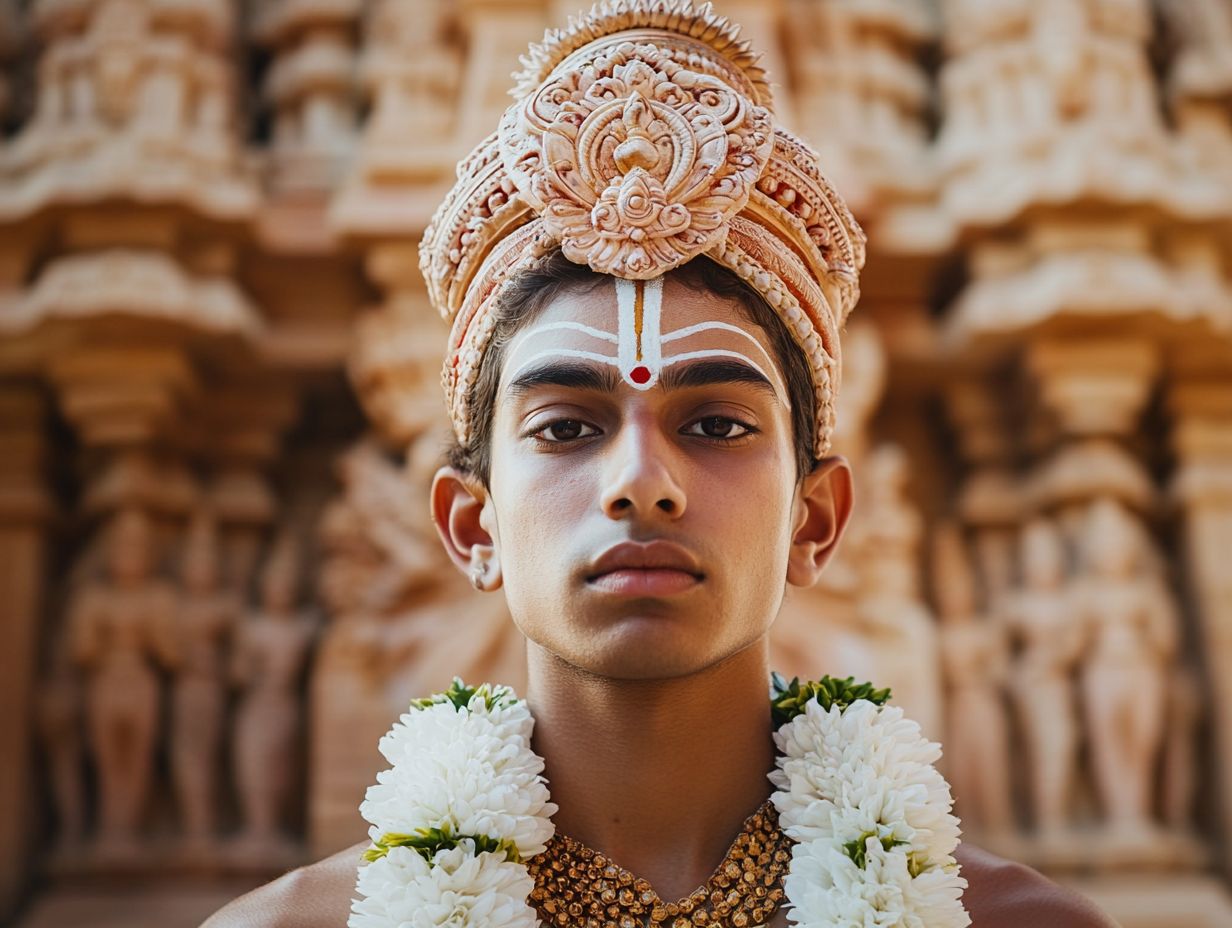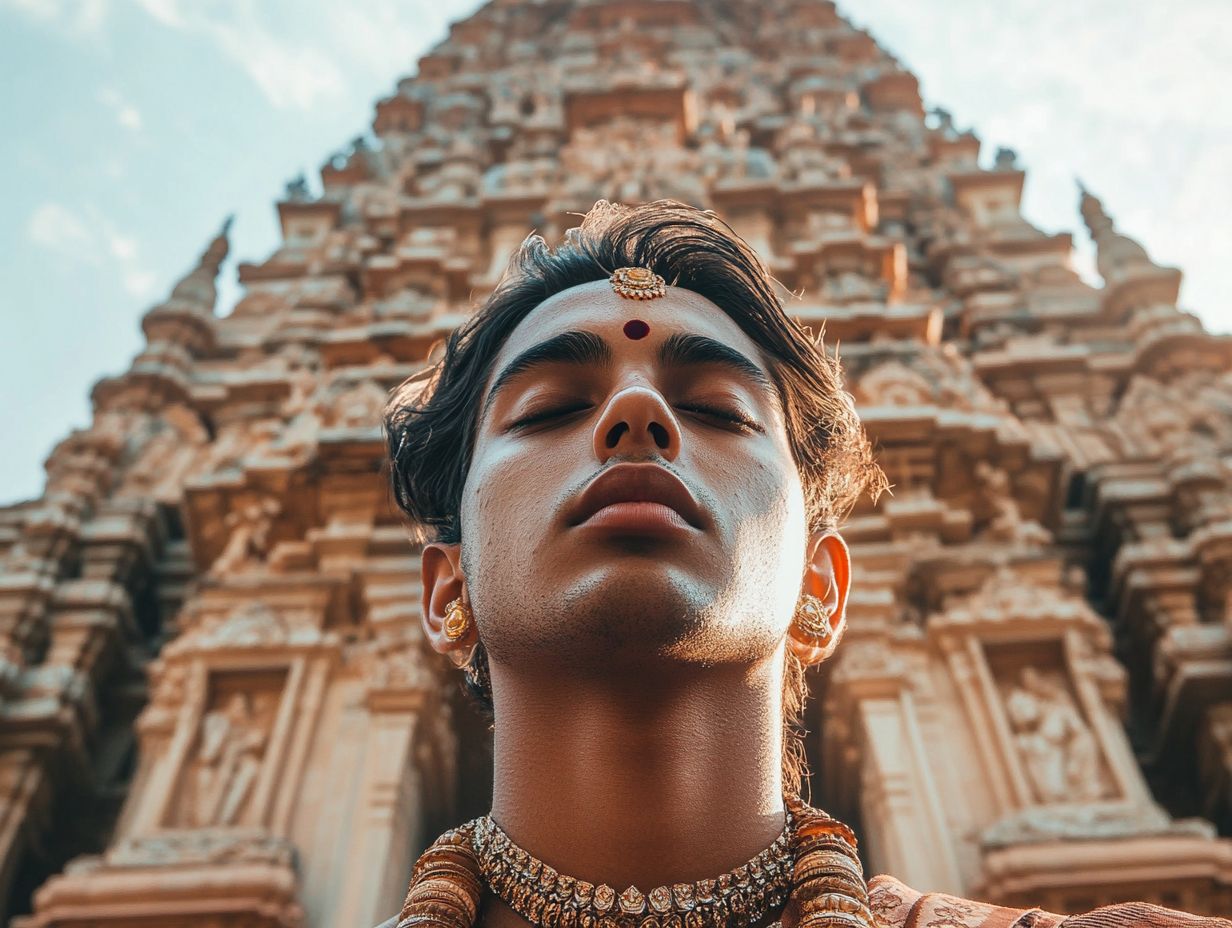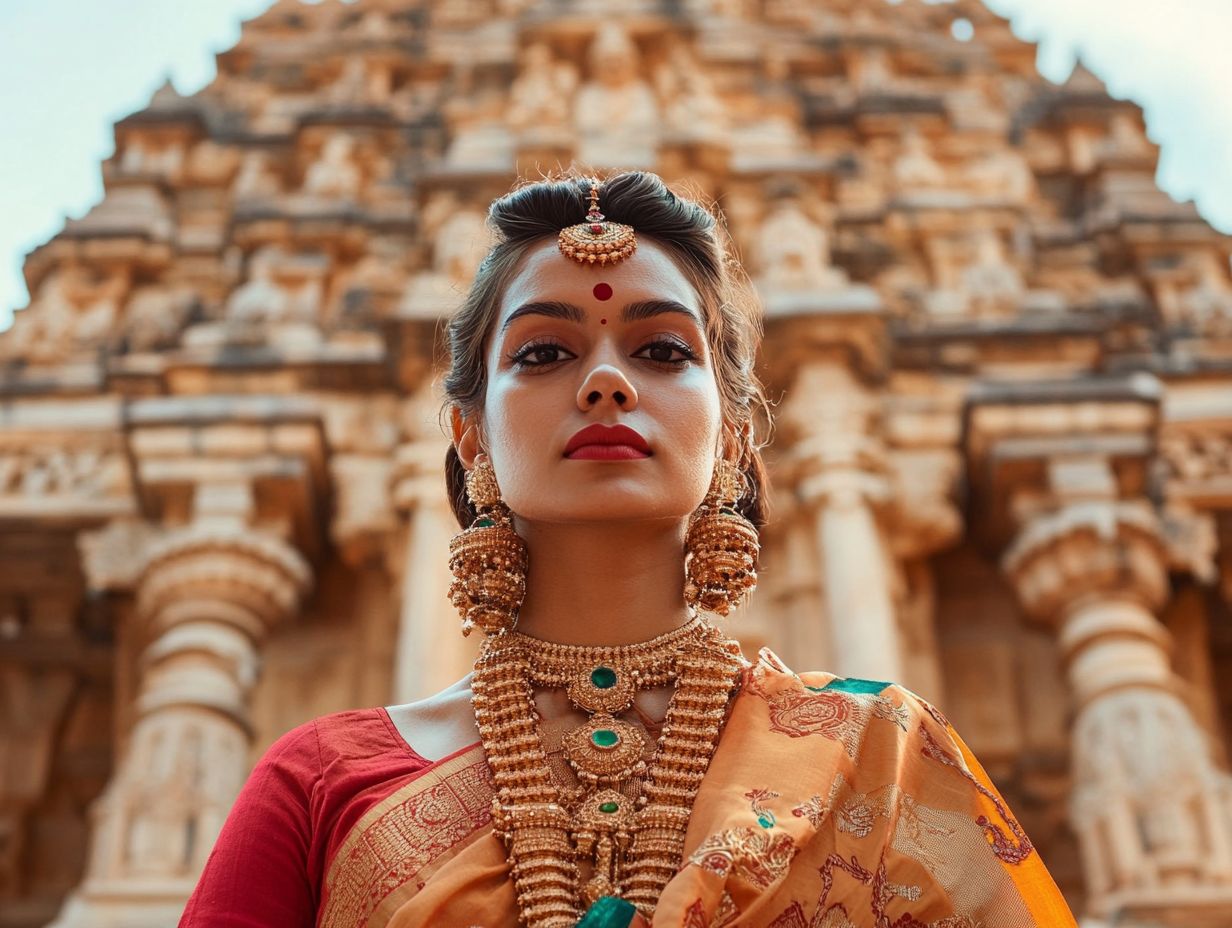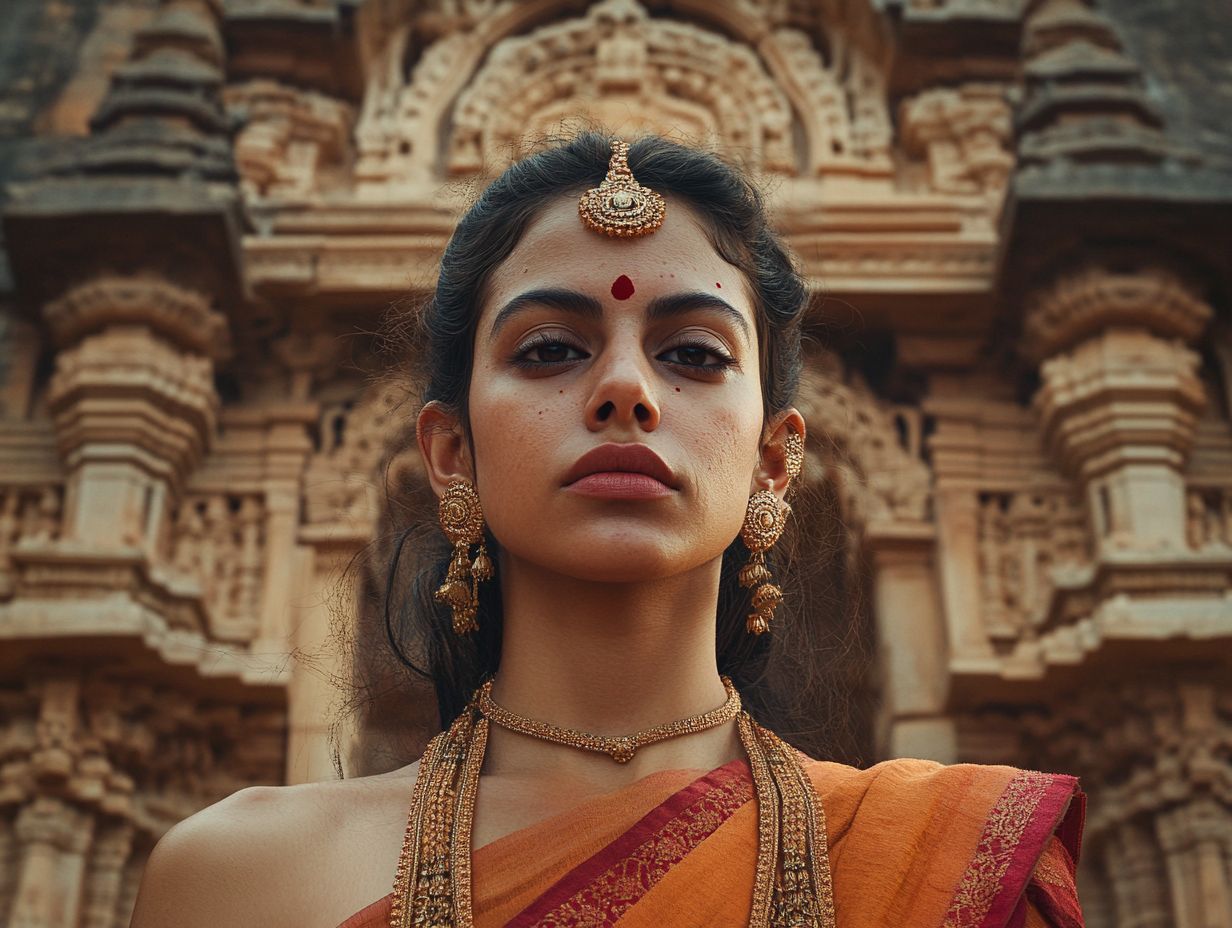Is Unibrow Lucky in Hinduism?
Unibrows often elicit a spectrum of opinions, yet within Hinduism, they embody profound cultural significance. This discussion delves into the unique symbolism of unibrows, highlighting their associations with the third eye, the goddess Laxmi, and the beliefs tied to good fortune.
It further investigates the interplay between modern beauty standards and traditional views on facial hair. By exploring various cultural perspectives on unibrows, one can attain a richer understanding of their significance in Hinduism and beyond.
What Is a Unibrow?

A unibrow, marked by the continuous growth of hair between the eyebrows, stands as a distinctive facial feature that has been interpreted in myriad ways across cultures and throughout history. In numerous societies, this trait is embraced as a symbol of individuality and uniqueness, while in others, it is often viewed through the lens of superstition or cultural beliefs.
The perception of a unibrow varies significantly, impacting personal identity, aesthetic value, and societal acceptance. To truly grasp the multifaceted nature of unibrows, one must explore the cultural symbolism, personal attributes, and societal perspectives that collectively shape the understanding of this remarkable feature.
What Is the Cultural Significance of Unibrows in Hinduism?
In Hinduism, the unibrow carries deep cultural significance, frequently regarded as a symbol of spiritual insight and divine connection. It is intricately associated with various Hindu deities and occupies a prominent role in rituals and traditions that honor personal attributes reflecting spirituality and wisdom.
The unibrow is perceived as a manifestation of blessings, drawing in auspicious energy and cosmic vibrations that resonate profoundly within the community’s beliefs. This intricate tapestry of symbolism underscores the relationship between physical features and spiritual attributes, thereby enriching the cultural identity inherent in Hindu practices and folklore.
1. The Symbolism of the Third Eye
The unibrow is frequently linked to the notion of the third eye in Hindu philosophy, representing elevated perception, spiritual wisdom, and a profound connection to the divine. This mystical interpretation aligns with the belief that certain facial features, including the unibrow, act as conduits for cosmic energy and insights, thereby enhancing an individual’s intuition and awareness.
Such symbolism reflects a nuanced understanding of one s spiritual journey, promoting a holistic perspective on personal attributes and their significance to fate and destiny.
The relationship between the unibrow and the third eye transcends mere aesthetics; it invites a deeper contemplation of how personal traits can influence an individual s ability to perceive and navigate the complexities of life. In various cultures, the third eye signifies inner vision, facilitating a unique flow of energy that resonates with one s spiritual path.
Viewed through this lens, the unibrow emerges as a potent emblem of both awareness and enlightenment.
By embracing such distinctive features, individuals may foster a heightened sense of clarity, tapping into their intrinsic wisdom and ultimately deepening their spiritual insights.
2. The Importance of Facial Hair in Hinduism
Facial hair, including the unibrow, is regarded as a significant feature within Hindu culture, often intertwined with identity and spirituality. In various traditions, facial hair is celebrated for its associations with masculinity, wisdom, and the profound power of divine connection.
The rituals and customs surrounding facial hair reflect a community’s beliefs regarding personal attributes and their importance in articulating cultural identity and fostering spiritual growth. This cultural perspective not only underscores the aesthetic value of facial features but also enriches the understanding of spirituality in the fabric of daily life.
Facial hair often symbolizes an individual’s journey toward self-realization and unity with the divine, serving as a tangible manifestation of spiritual aspirations. For many practitioners, the maintenance and grooming of facial hair transcend mere aesthetic choices; they constitute essential elements of daily rituals and community events.
Such practices signify a commitment to communal values and heritage, reinforcing social bonds while representing a profound, personal connection to one’s faith and ancestral customs. This dedication to personal attributes prompts contemplation on the pivotal role that external appearances play in shaping both individual and collective spiritual narratives.
3. The Concept of Laxmi, the Goddess of Wealth
Laxmi, the venerated Goddess of Wealth in Hinduism, is inextricably linked to symbols of prosperity and good fortune, a connection that intriguingly extends to the interpretation of physical traits, such as the unibrow. In various cultural narratives, the unibrow emerges as a representation of the blessings conferred by Laxmi, embodying both material and spiritual wealth. This association highlights how personal attributes can resonate with divine favor, underscoring the significance of aesthetics in rituals and beliefs that enhance community well-being and foster spiritual growth.
The unibrow, often esteemed as a sign of beauty within certain traditions, captures attention as a tangible manifestation of Laxmi’s divine grace. By embracing this distinctive trait, individuals have the opportunity to cultivate a deeper sense of identity that harmonizes with their cultural and spiritual heritage.
The understanding that such physical features may carry divine implications encourages a more expansive view of the ways in which spirituality weaves into the fabric of daily life. Acknowledging this connection opens the door to a richer appreciation of how various symbols, including the unibrow, reflect the intricate interplay of material success and spiritual fulfillment on one s path toward prosperity.
Is Having a Unibrow Considered Lucky in Hinduism?
In Hinduism, the unibrow is frequently viewed as an emblem of good luck and fortune, steeped in a rich tapestry of beliefs and superstitions that celebrate this distinctive characteristic.
It is often regarded as an auspicious feature that harmonizes individuals with divine energies and cosmic vibrations, implying that it may bestow blessings and prosperity upon them throughout their lives.
This cultural perspective illustrates a profound understanding of the intricate relationship between physical attributes and personal beliefs, as well as the spiritual significance ascribed to them within the community.
1. The Belief of Good Fortune Associated with Unibrows

The belief in good fortune associated with unibrows holds a significant place in Hindu culture, where this trait is perceived as an emblem of prosperity and divine blessings. Many individuals regard the unibrow as a marker of favor from the divine, suggesting an innate connection to spiritual energy capable of positively influencing their life paths. Such beliefs often mirror broader cultural identities that celebrate uniqueness and the inherent value of personal traits.
This perspective enriches the cultural narrative and profoundly impacts individual experiences, fostering a sense of pride among those who bear this distinctive feature. In Hindu communities, unibrows can symbolize a link to good luck, encouraging individuals to embrace their appearance as a sign of spiritual significance. Celebrations and rituals may even incorporate admiration for unibrows, reinforcing a collective mindset that values diversity and the blessings it brings.
As individuals navigate their personal journeys, the cultural appreciation for this trait serves as a poignant reminder of the deeper meanings in life, intertwining notions of luck, prosperity, and identity in a manner that honors both individuality and tradition.
2. The Superstitions Surrounding Unibrows
Superstitions regarding unibrows within Hindu culture exhibit a remarkable diversity, with perspectives ranging from positive associations to negative implications. These contrasting beliefs highlight a complex interplay of cultural perceptions and individual interpretations that shape one s understanding of this distinctive facial feature. While some consider a unibrow to be a harbinger of good fortune, others may view it as indicative of undesirable traits, thereby influencing personal identity and societal acceptance.
In certain communities, a unibrow is esteemed as a symbol of wisdom and strength, implying that individuals who bear this characteristic may possess deeper insight or heightened intuition. Conversely, other groups may interpret a unibrow as a marker of untidiness or lack of refinement, which can lead to stigmatization in various social contexts.
This juxtaposition creates a captivating dynamic, where the same physical trait can elicit admiration or disdain, contingent upon the cultural backdrop. The persistence of these beliefs underscores how superstitions often intertwine with broader societal norms, impacting personal interactions and guiding choices regarding self-presentation.
Thus, the unibrow transcends mere physical distinction; it encapsulates a rich spectrum of cultural attitudes and personal beliefs.
What Are the Different Beliefs About Unibrows in Hinduism?
Beliefs surrounding unibrows in Hinduism are marked by a rich array of interpretations, with perspectives differing considerably among various communities and individuals. These cultural interpretations often intersect with religious views and personal beliefs, contributing to a multifaceted understanding.
For some, unibrows are seen as positive attributes, symbolizing wisdom, spirituality, and divine favor. These beliefs are often connected to notions of fortune and auspiciousness. Conversely, others may view them with skepticism, linking these features to negative omens, inauspicious signs, or superstitions.
This spectrum of beliefs illustrates the intricate tapestry of cultural identity, community perceptions, and ethnic beliefs that influence the understanding and acceptance of unibrows within Hindu society.
1. The Positive Beliefs About Unibrows in Hinduism
In Hinduism, positive beliefs surrounding unibrows often emphasize their connection to spirituality, wisdom, good fortune, and auspicious traits. This distinctive facial feature is frequently regarded as a marker of divine blessings, suggesting that individuals who possess a unibrow are endowed with inherent charm and auspicious qualities. Such uplifting interpretations deepen the understanding of personal traits and their cultural significance, promoting acceptance and celebration of diversity.
Within traditional communities, the presence of a unibrow can signify a profound connection to the spiritual realm, implying a deeper insight or heightened intuition. This feature is often seen as an auspicious mark on the forehead.
This belief cultivates an atmosphere where individuals with unibrows are appreciated not merely for their appearance, but as bearers of extraordinary luck and spiritual gifts. Many hold these individuals in high regard, recognizing them as symbols of good fortune and prosperity.
These positive notions foster a sense of belonging and pride, encouraging a collective appreciation for the beauty of physical diversity while reinforcing the idea that every trait can carry its own unique blessings. This perspective aligns with Hindu philosophy and spiritual symbolism, emphasizing self-acceptance and personal reflection.
2. The Negative Beliefs About Unibrows in Hinduism
Negative beliefs surrounding unibrows in Hinduism frequently arise from cultural perceptions that link this physical trait to less desirable attributes or superstitions. These misinterpretations often stem from ancient texts and myths.
Some individuals might regard a unibrow as an omen of misfortune, leading to stigmas that adversely impact personal identity and societal acceptance. These unfavorable interpretations stand in stark contrast to more positive beliefs, underscoring the intricate ways in which unibrows are perceived within Hindu communities.
Such cultural biases can be profoundly detrimental to those who possess this characteristic, often resulting in ridicule, social exclusion, and challenges to their personal identity.
The societal pressure to conform to specific beauty standards compels many individuals to alter their appearance, which can severely affect their self-esteem and sense of self. The notion of unibrows as symbols of bad luck or negative superstitions only serves to perpetuate this divide, making it essential to confront and challenge these stereotypes.
By cultivating an environment of acceptance and understanding, society can celebrate the richness of individual differences rather than stigmatizing them.
How Do Hindus View Unibrows in Modern Society?
In contemporary society, the perception of unibrows among Hindus is experiencing a noteworthy transformation, driven by evolving beauty standards, personal beliefs, and cultural identity.
An increasing number of individuals are choosing to embrace their natural features, including unibrows, viewing them as symbols of uniqueness and personal expression.
This shift is indicative of a broader societal trend that celebrates individuality, challenging the restrictive beauty norms that have historically dictated notions of attractiveness.
1. The Influence of Western Beauty Standards

The influence of Western beauty standards on the perception of unibrows has sparked a range of reactions within Hindu communities, where traditional beliefs often collide with modern ideals of attractiveness. This intersection of cultural heritage and contemporary views shapes the dialogue on facial aesthetics.
In numerous instances, Western ideals promote specific facial aesthetics that may discourage acceptance of features like unibrows, leading individuals to wrestle with their cultural identity and societal expectations. This dynamic exemplifies the persistent tension between globalization and cultural heritage in shaping personal beliefs and perceptions.
For those who cherish their cultural roots, the unibrow can serve as a symbol of unique identity and beauty that stands apart from the mainstream narrative. As Western media increasingly saturates the landscape with particular beauty benchmarks, individuals frequently find themselves caught in an internal conflict, feeling pressured to conform. This struggle often manifests in self-esteem issues and a yearning to fit into a broader societal mold.
Consequently, it becomes essential for individuals to navigate these complexities, seeking a balance between honoring traditional aesthetics and adapting to contemporary norms. In doing so, they ultimately reshape the definition of beauty within their communities.
2. The Embracement of Natural Features in Hinduism
The growing trend within Hinduism of embracing natural features, including unibrows, signifies a cultural shift towards valuing individuality and authenticity over adherence to external beauty standards. This trend reflects a deeper appreciation for ethnic diversity and regional variations.
This movement encourages individuals to celebrate their unique traits, fostering a deeper connection to their cultural identity and heritage.
The acceptance of unibrows as a symbol of uniqueness reflects a broader trend toward holistic views of beauty that honor personal attributes and spiritual growth. This notion is deeply rooted in Hindu mythology and spiritual practices.
As society increasingly distances itself from rigid norms, many find enablement in the authenticity that comes from embracing their natural appearance. This perspective not only challenges traditional standards but also reinforces the belief that true beauty lies in the rich diversity of human features.
For followers of Hinduism, the embrace of the unibrow once considered something to be concealed has transformed into a proud acknowledgment of one s roots, ethnic diversity, and individual traits.
By recognizing unibrows as a powerful emblem of individuality, devotees cultivate a sense of community, inviting others to join in the celebration of what makes them uniquely beautiful.
What Are the Other Cultural Beliefs About Unibrows?
Beyond the confines of Hinduism, numerous cultures possess unique beliefs surrounding unibrows, deeply rooted in folklore and influenced by historical perspectives that reveal varying interpretations of spirituality, superstition, and beauty.
These diverse viewpoints weave together a rich tapestry of cultural narratives, recognizing the unibrow not merely as an aesthetic feature but also as a symbol of distinctive personal traits.
By exploring these cultural beliefs, one gains a deeper understanding of the global perceptions of unibrows, ultimately celebrating the multifaceted nature of human experience and expression.
1. The Perception of Unibrows in Different Cultures
The perception of unibrows varies significantly across cultures, with some viewing them as a distinctive symbol of individuality while others associate them with less favorable traits. These diverse beliefs highlight the cultural significance and symbolism of unibrows.
In certain communities, the unibrow is celebrated as a mark of distinction, highlighting how cultural narratives shape both personal and societal beliefs. These variations underscore the complex interplay between personal features and cultural identity, reflecting the richness of human experience.
For instance, in various Middle Eastern and Mediterranean cultures, the unibrow is often regarded as a sign of confidence and beauty, embodying strength and uniqueness. In contrast, Western societies, which tend to favor more conventional grooming standards, may cast the unibrow in a less favorable light, reinforcing notions of nonconformity and awkwardness.
This duality illuminates the ongoing dialogue between individual expression and prevailing cultural norms, demonstrating how such narratives influence not only self-perception but also societal attitudes toward physical characteristics and facial features.
2. The History of Unibrows in Different Societies
The history of unibrows across various societies unveils a rich tapestry of cultural significance, rituals, and evolving perceptions, emphasizing the diverse meanings attributed to this distinctive facial feature.
Throughout different historical contexts, unibrows have symbolized a range of attributes, from wisdom and spirituality to stigma and superstition, mirroring the shifting values and beliefs of each society.
This exploration offers profound insights into how unibrows have influenced cultural narratives and individual identities through the ages.
In ancient Egypt, for example, unibrows were celebrated as a mark of beauty, often associated with the goddess Hathor, a personification of love and fertility. This reverence can be seen in their historical iconography and myths.
Conversely, during certain periods in Western culture, unibrows endured negative connotations, often linked to a perceived lack of grooming or refinement.
Various indigenous cultures, however, embraced this feature as a symbol of strength and uniqueness. These cultural beliefs continue to influence visual symbols and identity markers in modern society.
As globalization intertwines different cultural threads, the contemporary interpretation of unibrows is undergoing a transformation, prompting societies to reassess aesthetic standards and appreciate individual differences. Thus, unibrows emerge not merely as a physical characteristic but as a canvas for exploring deeper narratives about identity and acceptance throughout history.
Frequently Asked Questions
Is having a unibrow considered lucky in Hinduism?

No, having a unibrow is not specifically considered lucky or unlucky in Hinduism. It is simply a physical characteristic and is not related to luck or fortune.
Is it true that people with a unibrow are believed to possess special powers in Hinduism?
No, there is no belief in Hinduism that having a unibrow gives a person special powers. Such beliefs are purely based on individual superstitions and do not have any basis in Hinduism.
Are there any references to unibrows in Hindu scriptures or mythology?
No, there are no specific mentions of unibrows in Hindu scriptures or mythology. Physical appearance is not a significant factor in Hinduism and is not mentioned in religious texts.
Is there any significance to the shape of a unibrow in Hinduism?
No, there is no significance to the shape of a unibrow in Hinduism. As mentioned, physical appearance is not given importance in the religion and it is not associated with any particular meaning or symbolism.
Are there any rituals or practices related to unibrows in Hinduism?
No, there are no rituals or practices related to unibrows in Hinduism. Physical appearance is not a factor in religious practices and customs, which are focused on spiritual beliefs and principles.
Is it considered disrespectful to have a unibrow in Hindu culture?
No, there is no cultural or religious belief that having a unibrow is disrespectful in Hinduism. It is simply a physical characteristic and is not given any significance in the culture.
